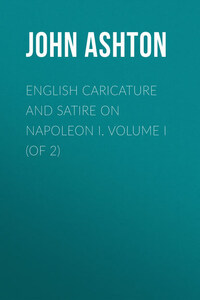PREFACE
This book is not intended to be a History of Napoleon the First, but simply to reproduce the bulk of the Caricatures and Satires published in England on our great enemy, with as much of history as may help to elucidate them.
The majority of the caricatures are humorous; others are silly, or spiteful – as will occasionally happen nowadays; and some are too coarse for reproduction – so that a careful selection has had to be made. Gillray and Rowlandson generally signed their names to the work of their hands; but, wherever a caricature occurs unsigned by the artist, I have attributed it, on the authority of the late Edward Hawkins, Esq., some time Keeper of the Prints at the British Museum, to whatever artist he has assigned it. I have personally inspected every engraving herein described, and the description is entirely my own.
Should there, by chance, be an occasional discrepancy as to a date, it has been occasioned by the inconceivable contradictions which occur in different histories and newspapers. To cite an instance: in three different books are given three different dates of Napoleon leaving Elba, and it was only by the knowledge that it occurred on a Sunday, and by consulting an almanac for the year 1815, that I was able absolutely to determine it.
The frontispiece is taken from a very rare print, and gives a novel view of Napoleon to us, who are always accustomed to see him represented in military uniform.
That my readers may find some instruction, mingled with the amusement I have provided for them, is the earnest wish of
BIRTH AND GENEALOGY – HIS OWN ACCOUNT – MAJORCAN OR GREEK EXTRACTION – ENGLISH BIOGRAPHIES
Curiously enough, it has never been practically settled whence the ancestors of Napoleon Bonaparte came. He, himself, cared little for the pride of birth, and when, during his Consulate, they manufactured for him a genealogy descending from a line of kings, he laughed at it, and said that his patent of nobility dated from the battle of Montenotte.
But, still, one would think he ought to know, for family tradition is strong; and if it can be trusted, this is his own account. ‘One day Napoleon questioned Canova about Alfieri, and Canova found an opportunity to render an important service to Florence, &c. “Sire,” said he, “authorise the President of the Academy of Florence to take care of the frescoes and pictures. I heartily wish it. That will reflect great honour on your Majesty, who, I am assured, is of a noble Florentine family.” At these words the Empress (Maria Louisa) turned towards her husband and said: – “What! are you not Corsican?” “Yes,” replied Napoleon, “but of Florentine origin.” Canova then said: – “The President of the Academy of Florence, the Senator Allessandria, is of one of the most illustrious houses in the country, which has had one of its ladies married to a Bonaparte, thus you are Italian, and we boast of it.” “I am, certainly,” added Napoleon.’1
Prince Napoleon Louis Bonaparte (brother to the Emperor) published in 1830, at Florence, a French translation of an old book2 about the sack of Rome, 1527, which gives an account of the family of the writer. But Majorca also puts in a claim to the older Bonapartes; and in 1852, Don Antonio Furio, a learned man, Member of the Royal Academies of Belles Lettres of Barcelona and Majorca, &c., made a declaration as to ‘the rank, dignity, and extinction of the noble family of Bonapart in the island of Majorca;’ and quotes from a book kept in the archives of Palma, in which are preserved the armorial escutcheons of the noble families of the Island, the arms of Bonapart – which were Dexter, on a field Azure, six stars, Or, placed two by two, Sinister, on a field gules, a lion rampant, Or; and the Chief Or, bears a scared eagle, sable. He says the family came from Genoa to Majorca, in which island its members were considered noblemen, and they filled several distinguished offices. In a register of burials relating to knights and gentlemen, written in 1559, the antiquity and nobility of the Bonaparts are clearly authenticated; and it would seem from Don Furio’s account (for all of which he gives chapter and verse) that the learned jurisconsult Don Hugo Bonapart left Majorca and went to Corsica, where, in 1411, he was made Regent of the Chancery of that place; and, as he settled there, his name was inscribed in the Golden Book of France.
This seems pretty circumstantial, until another theory appears – namely, his Greek extraction. Sir J. Emerson Tennent says:3 ‘There is a story relative to the family name of the Bonapartes, that somewhat excites curiosity as to the amount of truth which it may contain. In 1798, when Napoleon was secretly preparing for his descent upon Egypt, among other expedients for distracting and weakening the Porte, French emissaries were clandestinely employed in exciting the Greeks in Epirus, and the Morea, to revolt. In Maina especially (the ancient Sparta), these agents were received with marked enthusiasm, on the ground that Bonaparte was born in Corsica, where numbers of Greeks from that part of the Morea had found an asylum after the conquest of Candia, in 1669, but they were eventually expelled by the Genoese.














